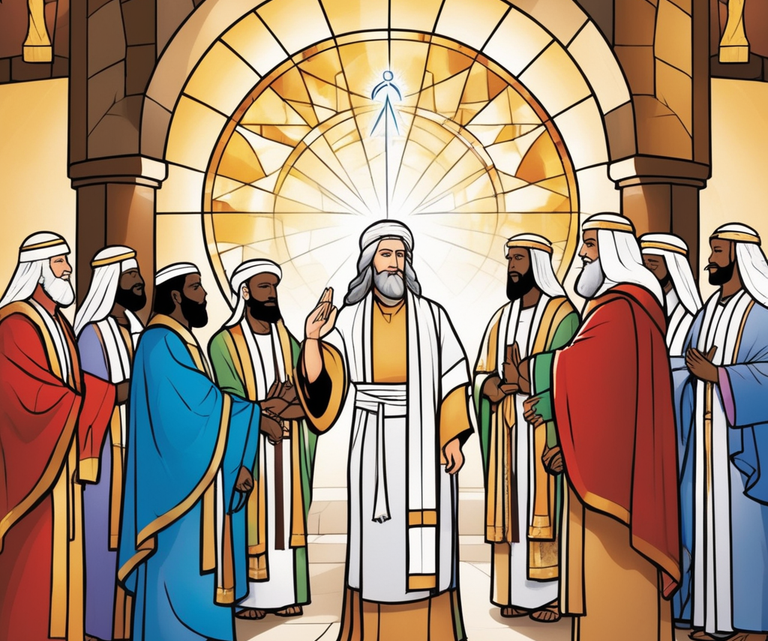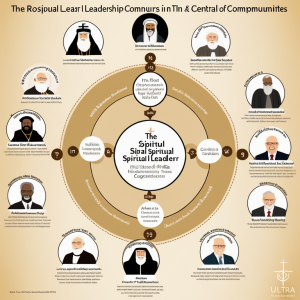The Ultimate Intercessor: Yeshua as Our Great High Priest and the Human Layers that Obscure Him


Introduction
The role of spiritual leadership in religious communities is often a central point of focus. Ministers, pastors, and bishops stand as the shepherds of their congregations, providing guidance and wisdom. However, this hierarchy raises an important question: are these human leaders inadvertently standing in the way of our true Mediator, Yeshua, the Great High Priest?
Yeshua, the Great High Priest
The Unique Role
The New Testament introduces Yeshua as our Great High Priest, a mediator who stands between humanity and Yehovah, providing a bridge for reconciliation, intercession, and grace. Unlike human priests, Yeshua’s role is unique because he himself is sinless and eternal.
References
- Unique Role: Hebrews 4:14-16
- Sinless Nature: Hebrews 7:26-28
- Eternal Priesthood: Hebrews 7:23-25
The Veil is Torn
The tearing of the temple veil at the time of Yeshua’s crucifixion symbolized that the barrier between humanity and Yehovah was removed. Yeshua’s sacrifice granted us direct access to the throne of Yehovah, an act that no human priest could achieve.
References
- Tearing of the Veil: Matthew 27:50-51
- Symbolism of the Veil: Hebrews 10:19-22
The Role of Human Spiritual Leaders: A Double-Edged Sword
Guidance and Education
Spiritual leaders undoubtedly offer valuable lessons and guidance. They educate communities, provide pastoral care, and are often the first point of contact for those seeking to understand the faith.
Reference
- Role of Leaders: Ephesians 4:11-13
The Potential for Obstruction
However, there’s a risk: these human intermediaries can sometimes create barriers rather than bridges. Layers of church tradition, dogma, or the personalities of these leaders themselves can obscure the direct relationship Yeshua offers.
Reference
- Caution Against Human Leaders: 1 Corinthians 1:12-13
The Dangers of Misplaced Authority
Shifting Focus
Entrusting ultimate spiritual authority to human leaders can distort the core message of the New Testament, which places Yeshua as the center of our faith. Instead of facilitating, they can become stumbling blocks, diluting the centrality of Yeshua’s role.
Reference
- Centrality of Christ: Colossians 1:18
Creating Dependency
Unbalanced focus on human leadership can lead to dependency on religious structures rather than a personal relationship with Yehovah through Yeshua.
Reference
- Warning Against Dependency: Matthew 23:9
Reclaiming Our Direct Access to the Divine
Personal Relationship
Recognizing Yeshua as the Great High Priest means acknowledging that we can have a direct and personal relationship with Yehovah. It reinstates the direct access that Yehovah intended for us.
References
- Direct Access: Hebrews 4:16
- Personal Relationship: John 14:6
Empowerment Through Understanding
Understanding our direct access to Yehovah through Yeshua empowers believers to study the scriptures, pray, and seek Yehovah’s guidance without the need for human mediation.
References
- Scriptural Study: 2 Timothy 2:15
- Prayer: Philippians 4:6-7
Conclusion
Ministers, pastors, and bishops have significant roles to play in our spiritual journey. However, their positions should not overshadow the ultimate and irreplaceable role of Yeshua as our Great High Priest. Revisiting and realigning our focus can offer a richer, more direct relationship with the Divine, free from the layers that may obscure our spiritual vision.

